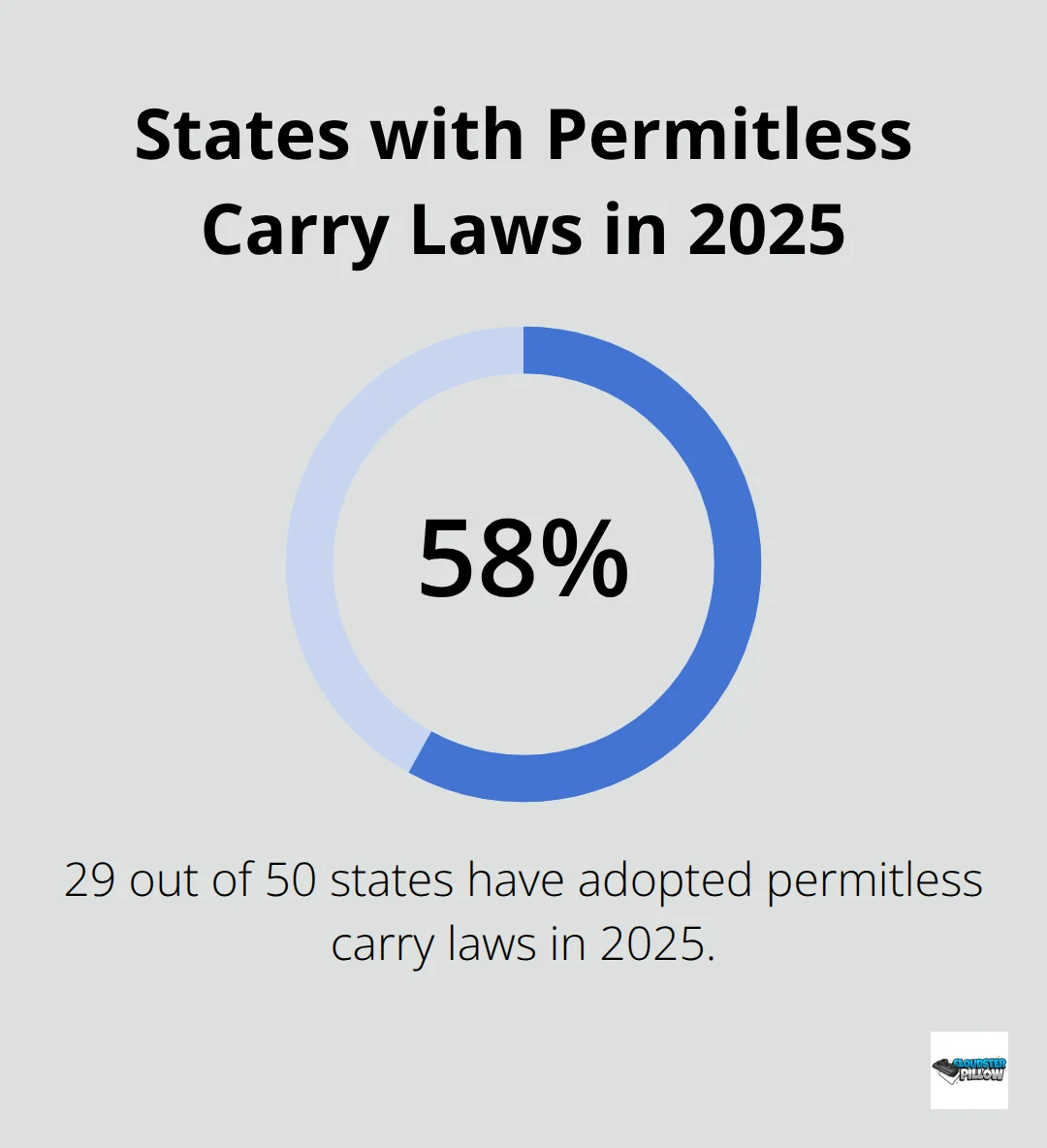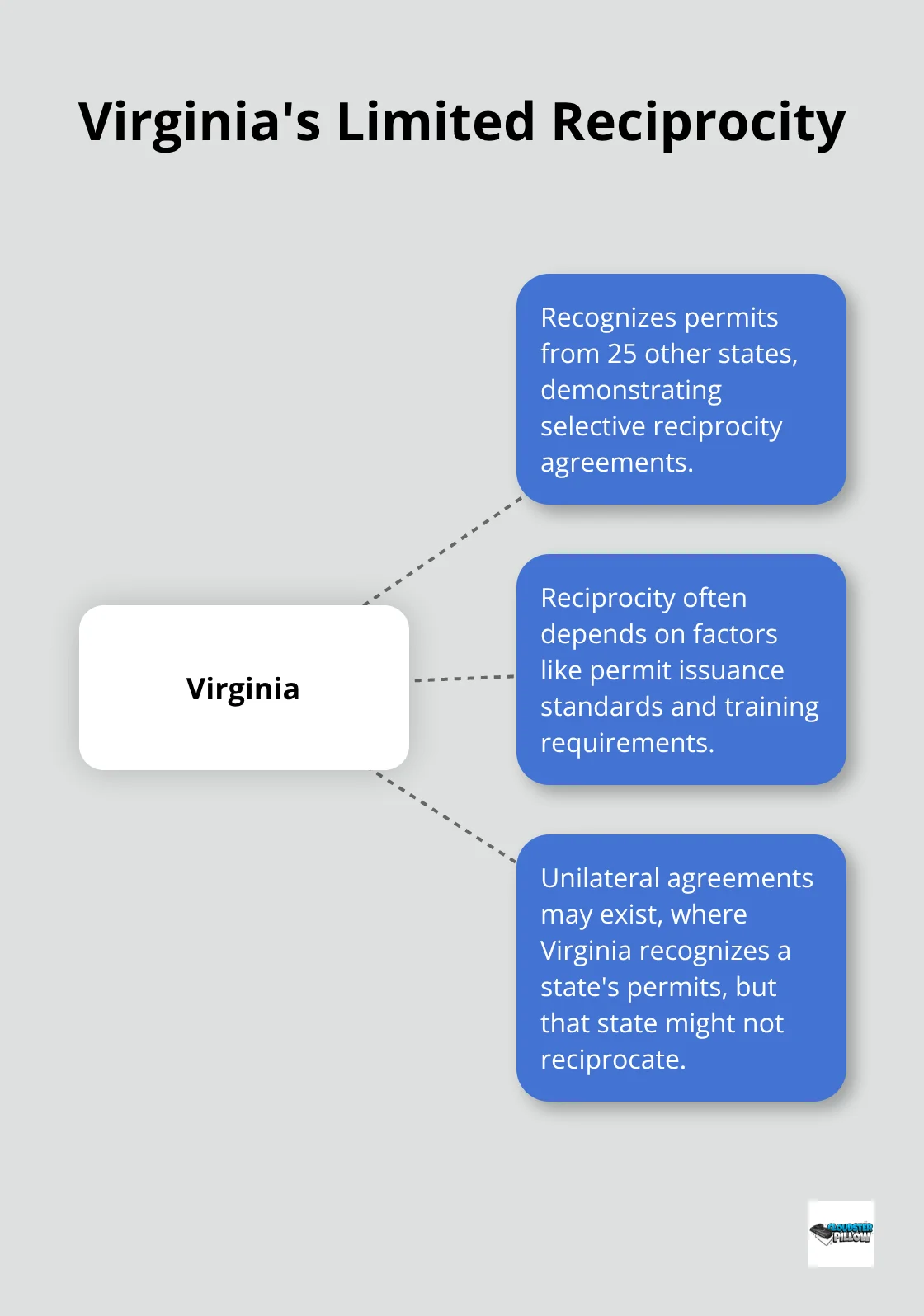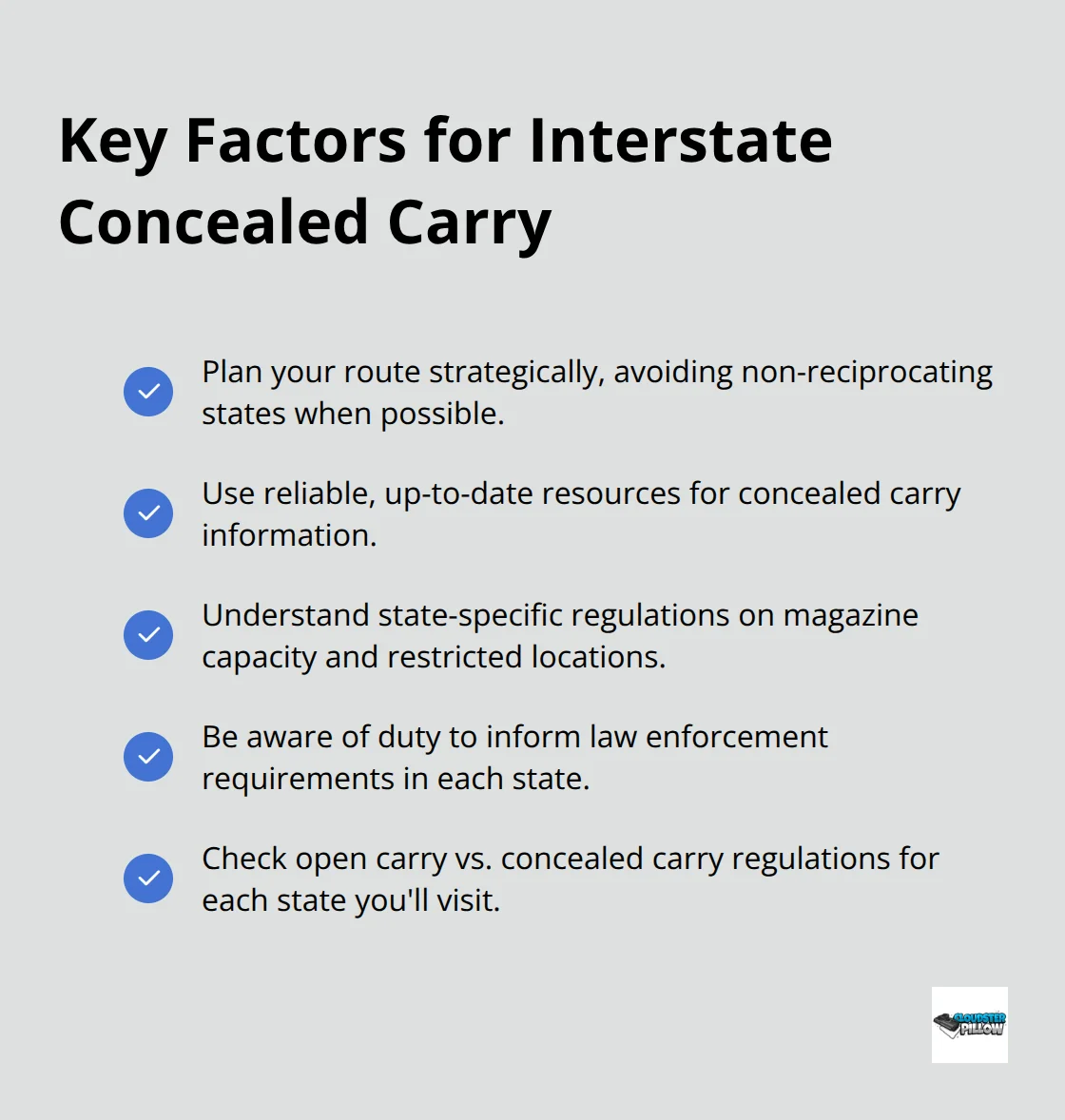CCW Courses and Tips
Concealed Carry Reciprocity Maps [2025]
At Cloudster Pillow, we understand the importance of staying informed about concealed carry reciprocity laws. These regulations can significantly impact your ability to legally carry across state lines.
In this 2025 update, we’ll explore the current concealed carry reciprocity map and provide essential tips for responsible interstate travel with your firearm. Whether you’re a seasoned CCW holder or new to carrying, this guide will help you navigate the complex landscape of reciprocity agreements.
What is Concealed Carry Reciprocity?
The Basics of Reciprocity
Concealed carry reciprocity forms the foundation of interstate firearm carry. It represents an agreement between states that allows a person with a valid concealed carry permit from one state to legally carry a concealed firearm in another state. This concept simplifies travel for responsible gun owners and ensures consistent personal protection across state lines.
How Reciprocity Works
Reciprocity boils down to mutual trust. When states enter a reciprocity agreement, they acknowledge the validity of each other’s permit issuance processes. For instance, a Texas permit holder can legally carry in Arizona due to their reciprocity agreement. However, that same permit won’t be recognized in California, which lacks reciprocity with Texas.
The Importance of Understanding Reciprocity
Knowledge of reciprocity keeps CCW holders legally compliant. Carrying a concealed weapon in a non-reciprocating state can result in severe penalties. Moreover, reciprocity enables consistent personal protection strategies during interstate travel, a key consideration for many CCW permit holders.
Navigating the Changing Landscape
Reciprocity agreements aren’t set in stone. They evolve based on new legislation and policy shifts. As of 2025, some states have broadened their reciprocity agreements, while others have implemented stricter regulations. To stay informed, CCW holders should regularly check official state websites or use reputable CCW apps that provide current reciprocity information.
Beyond Reciprocity: State-Specific Laws
While reciprocity opens doors for interstate carry, it doesn’t override individual state laws. Even with a recognized permit, carriers must adhere to the specific regulations of the state they’re in. These may include restrictions on carry locations, magazine capacity limits, or allowed firearm types for concealed carry.
The complex nature of reciprocity underscores the need for thorough research and preparation before traveling with a concealed firearm. As we move forward, let’s examine the current concealed carry reciprocity map for 2025 and explore how it impacts CCW permit holders across the United States.
Where Can You Carry in 2025?
Universal Recognition States
As of 2025, 29 states have adopted permitless carry laws (also known as constitutional carry). These states allow law-abiding citizens to carry concealed firearms without a permit. Florida joined this list in 2023, with Nebraska following in 2024. States like Arizona, Kansas, and Missouri not only permit permitless carry for residents but also recognize permits from all other states. This universal recognition simplifies travel for CCW holders, but local laws still apply regarding carry locations and methods.

States with Limited Reciprocity
Several states maintain more selective reciprocity agreements. Virginia recognizes permits from 25 states, while Pennsylvania honors 22 states’ permits. These agreements often depend on factors like permit issuance standards and training requirements. CCW holders should note that reciprocity can be unilateral. State A might recognize State B’s permits, but State B might not reciprocate. It’s essential to check both your home state and destination state’s laws before traveling.

Non-Reciprocating States and Restrictions
Some states, particularly those with stricter gun laws, have limited or no reciprocity agreements. California, Hawaii, New York, and New Jersey do not recognize out-of-state permits. Carrying in these states without a locally-issued permit is illegal and can result in severe penalties (including fines and imprisonment).
Even in states with reciprocity, restrictions may apply. Colorado and Connecticut have magazine capacity limits that affect what you can legally carry, regardless of your permit’s validity. Some states also prohibit carrying in specific locations like schools, government buildings, or establishments that serve alcohol.
Staying Informed and Compliant
The concealed carry landscape changes rapidly. We recommend using official state resources and reputable CCW apps to stay current on reciprocity agreements and local carry laws. Responsible concealed carry extends beyond legal compliance. It involves continuous training, situational awareness, and a commitment to safety.
As we move forward, let’s explore how to navigate the challenges that arise when carrying across state lines and discuss strategies to ensure you stay on the right side of the law.
How to Safely Navigate Concealed Carry Across State Lines
Plan Your Route Strategically
When you plan your trip, map out your route with concealed carry laws in mind. Try to avoid states that don’t recognize your permit. If you must travel through non-reciprocating states, learn about federal laws on transporting firearms. The Firearm Owners Protection Act (FOPA) guarantees the right of a law-abiding person to transport an unloaded firearm between locations where they may legally possess it, but you must follow specific requirements.
Use Reliable Resources for Up-to-Date Information
Laws change often, so you need current, reliable sources. The USCCA’s Concealed Carry Reciprocity Map updates regularly and provides detailed information on state-specific laws. State government websites are also authoritative sources for the latest regulations. Apps like CCW – Concealed Carry 50 State offer real-time updates and can help travelers immensely.
Understand State-Specific Regulations
Even in states that recognize your permit, local laws can differ significantly. Pay attention to:
- Magazine capacity limits
- Restricted locations (schools, government buildings, etc.)
- Duty to inform law enforcement
- Open carry vs. concealed carry regulations
Colorado limits magazine capacity to 15 rounds, while New Jersey restricts it to 10. Knowing these details will keep you compliant and help you avoid legal issues.

Common Pitfalls to Avoid
One frequent mistake assumes that reciprocity is always mutual. Just because your state recognizes permits from State X doesn’t mean State X recognizes yours. Always double-check.
Another pitfall misunderstands “constitutional carry” states. While these states allow permitless carry for residents, they may still require non-residents to have a valid permit. As of September 1, 2025, Handgunlaw.us recommends that at a minimum, a person should carry their “State Drivers License/Photo ID” when carrying under Permitless Carry.
Don’t rely on outdated information. Laws from even a year ago may no longer apply. The concealed carry landscape changes constantly, with states like Florida and Nebraska recently adopting permitless carry laws.
Responsible concealed carry requires more than just the right gear – it demands the right knowledge and mindset. Stay informed and plan carefully to carry confidently and legally across state lines.
Final Thoughts
Concealed carry reciprocity demands constant vigilance from responsible gun owners who travel across state lines. The landscape of reciprocity agreements continues to evolve, with some states expanding recognition while others maintain stricter regulations. Gun owners must check official state resources and reputable CCW apps regularly to stay current with the latest reciprocity information.
Understanding state-specific regulations on magazine capacity, restricted locations, and the duty to inform law enforcement is essential for legal compliance. Accessories like the Cloudster Pillow can enhance comfort for inside-the-waistband and appendix carry while improving concealment. Such tools, combined with thorough knowledge of reciprocity laws, contribute to a more confident and secure carry experience.
Concealed carry reciprocity is a responsibility that extends beyond legal concepts. Gun owners must plan routes carefully, consider which states recognize their permits, and prioritize safety and legality at all times. Even in states with permitless carry, non-residents may still need a valid permit (always check local laws).

![Concealed Carry Reciprocity Maps [2025]](https://cloudsterpillow.com/wp-content/uploads/emplibot/concealed-carry-reciprocity-hero-1757625144.webp)

Pingback: What You Need to Know About Traveling with a Firearm - Cloudster Pillow